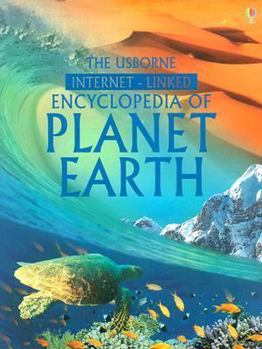Encyclopedia of Planet Earth
(Part of the Usborne Internet-Linked Series and Usborne Encyclopedias Series)
Select Format
Select Condition 
Book Overview
Enciclopedia del planeta Tierra es una introduccion completa y dinamica a la geografia fisica, que explora las caracteristicas mas espectaculares de nuestro mundo. Este libro, ilustrado con... This description may be from another edition of this product.
Format:Hardcover
Language:English
ISBN:0794505341
ISBN13:9780794505349
Release Date:January 2004
Publisher:Usborne Books
Length:160 Pages
Weight:2.40 lbs.
Dimensions:0.8" x 8.8" x 11.1"
Age Range:9 to 12 years
Grade Range:Grades 4 to 7
Customer Reviews
2 ratings
Great Internet Resource and Good Book
Published by Thriftbooks.com User , 19 years ago
I'm an elementary science teacher in New York State. I've found the "Encyclopedia of the Planet Earth" an excellent companion to my classroom curriculum. The book's photos and diagrams are an excellent enrichment tool for the classroom, but what makes this book really valuable are the internet resources that coincide with the content from the book. Usborne has done a great job designing a website with enrichment activities and demonstrations that align directly with the content in the book. I highly recommend this book for elementary science teachers and classroom teachers that are looking for great sites related to Earth Science topics.
Earth enthusiast's delight
Published by Thriftbooks.com User , 22 years ago
The publishers of this spectacular feast for the eyes would more aptly describe this reference volume for young adults as an Earth Album. Its seven sections brilliantly cover just about every topic that shaped, affects and changes the plant we live on. The book opens with an 18-page section briefly describing the Planet Earth, beginning with its place and size relative to the Solar System and Universe. A second two-page spread describes how our home looks from outer space, and the mapping of even remote regions for which satellites (among other things) have been employed. Kids will discover the factors that create and change the seasons, as well as the scientific explanations of day and night. Those who joke about digging to China or America (as the case may be), can inspect a cross-section of the Earth's core, learn about its crust and faults (as in earthquake zones) and a bit about the rocks, minerals and fossils scientists have found here. Four more pages explain the earth's many mineral and metal resources, as well as its fossil and other energy supplies. In a second 18-page section on Earthquakes and Volcanoes, kids discover the intense forces that explode, grow, shift and change the earth. They learn about volcanic hot spots --- especially hot places on the Earth's mantle through which extra-hot magma can shoot up and burn through the Earth's crust to erupt on the surface. They discover the various kinds of lava, and what creates hot springs and rocks. They explore volcanic islands, and view one such place being created and see one of Hawaii's black beaches. No section on Earth's violent center would be complete without an explanation of the ruin sometimes created by earthquakes, and how they happen --- and this doesn't disappoint. The section on Climate expands to 28 pages, given the vast atmosphere and ground there is to cover. Kids learn about the Earth's atmosphere and its five layers (including of course the threatened ozone layer), its air and ocean currents (including El Nino) as well as the natural carbon and nitrogen cycles that help keep climate in balance. The book introduces the possibility that global warming and a greenhouse effect may be damaging Earth's weather balance (without concluding definitively that they are). Kids learn about the various climates, including mountain, sea, arctic, tropical, desert and temperate climates, exploring a few pages on types within each group --- from tropical rainforests, grasslands and deserts to polar, mountainous and temperate grasslands. The 16 pages on Weather describe both its importance to life and its formation and more extreme aspects. Kids learn about the water cycle that makes rain, what creates thunderstorms and windstorms (including tornadoes, hurricanes and sea spouts) and why floods and droughts occur and what can happen when they do. The book notes the severe drought that hit the Southern Great Plains of the U.S. from 1931 to 1938, creating the legendary Dust Bowl







